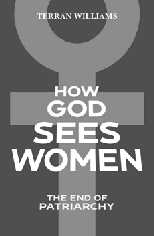"How God Sees Women: The End Of Patriarchy" -- By: Tom Sculthorpe
Journal: Eikon
Volume: EIKON 06:2 (Fall 2024)
Article: "How God Sees Women: The End Of Patriarchy"
Author: Tom Sculthorpe
Eikon 6.2 (Fall 2024) p. 152
How God Sees Women: The End Of Patriarchy
Tom Sculthorpe is the Director of Math Education at Memoria Press and a teacher at Highlands Latin School in Louisville, KY where he resides with his wife and five children. He holds a Ph.D. in Biblical Theology from The Southern Baptist Theological Seminary.

Terran Williams. How God Sees Women: The End of Patriarchy. Cape Town, South Africa: The Spiritual Bakery, 2022.
Introduction
A recent, lengthy entry into the never-ending egalitarian vs. complementarian debate among evangelicals, How God Sees Women is penned by Terran Williams, a former mega-church pastor in Cape Town, South Africa. Williams now writes and ministers through his personal ministry website where his stated objective is, “Building bridges from God’s Word to your world.” A self-professed former “soft complementarian,” Williams frames his “theology of women” as a repentant memoir of sorts. His biblically informed thesis is that God sees men and women in a mutualist framework, that is, distinct yet equal ministry partners in all spheres of life with shared authority, gifting, and expertise.
Summary
Williams attempts to demonstrate his thesis in four parts with several appendices. In part one, he interprets both church history
Eikon 6.2 (Fall 2024) p. 153
and Genesis 1–3, arguing that “for most of its history, the church believed in the inherent inferiority of females,” and that “Genesis 2…does not teach that inherent to maleness is leadership, and inherent to femaleness is submission. What it affirms instead is the unity, mutuality, and equality between men and women — not hierarchy.”
In part two, he offers egalitarian interpretations of New Testament texts that typically serve as the exegetical foundation for the complementarian position, namely 1 Corinthians 11:3–16 and 14:33–35, 1 Timothy 2:11–15, and Ephesians 5:22–33. The hermeneutical basis for his conclusions is “accommodation.” God inspired the biblical authors to give “hat-tips” to the patriarchy to guard the credibility and evangelistic attractiveness of the gospel and the “fledgling” local churches in the eyes of the watching ancient world.
In part three, Williams surveys “powerful” women in the Bible, concluding that self-...
Click here to subscribe
